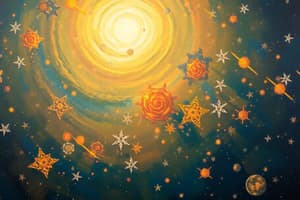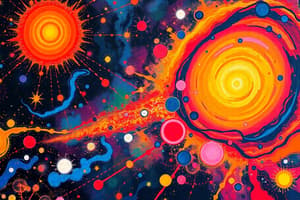Podcast
Questions and Answers
Carl Sagan said, "We are made of star stuff." Which element is the lightest, the most abundant in the universe, and is also found in humans?
Carl Sagan said, "We are made of star stuff." Which element is the lightest, the most abundant in the universe, and is also found in humans?
- lithium
- iron
- helium
- hydrogen (correct)
Heavier elements are created in different types of stars as they die or explode. What is the process that is produced inside the stars that transforms hydrogen into helium, heat, and radiation?
Heavier elements are created in different types of stars as they die or explode. What is the process that is produced inside the stars that transforms hydrogen into helium, heat, and radiation?
- proton and neutron
- nucleus
- star nucleosynthesis (correct)
- stellar nucleosynthesis
Scientists believe that the Big Bang theory has some stages in the formation of the universe which began through the eruption/blasting of the universe. What sequence of events best describes the widely accepted stages in the formation of the universe?
Scientists believe that the Big Bang theory has some stages in the formation of the universe which began through the eruption/blasting of the universe. What sequence of events best describes the widely accepted stages in the formation of the universe?
- Singularity, Inflation, Nucleosynthesis Recombination (correct)
- Primordial Singularity, Nucleosynthesis, Recombination
- Expansion, Singularity, Nucleosynthesis, Singularity
- Expansion, recombination, nucleosynthesis, Recombination
Protons and neutrons combined in the center of the star and formed the lightest to heavier elements, which was eventually followed by the different elements in the periodic table and the formation of molecules/compounds. How does this molecule/compound form?
Protons and neutrons combined in the center of the star and formed the lightest to heavier elements, which was eventually followed by the different elements in the periodic table and the formation of molecules/compounds. How does this molecule/compound form?
It is a device that is used to speed up the protons to overcome the repulsion between the protons and the target atomic nuclei by using magnetic and electrical fields.
It is a device that is used to speed up the protons to overcome the repulsion between the protons and the target atomic nuclei by using magnetic and electrical fields.
In a chemical reaction which among the choices is the term used when two or more nuclei combine to form heavier nuclei?
In a chemical reaction which among the choices is the term used when two or more nuclei combine to form heavier nuclei?
Using electron configuration, what is the highest energy level and the number of electrons of sulfur?
Using electron configuration, what is the highest energy level and the number of electrons of sulfur?
In an experiment, it was observed that oil was immiscible with water, same behavior when it was combined with vinegar but when water was added to vinegar, they were miscible. What does this mean?
In an experiment, it was observed that oil was immiscible with water, same behavior when it was combined with vinegar but when water was added to vinegar, they were miscible. What does this mean?
What covalent bond is present if the electronegativity difference between atoms is equal/balance?
What covalent bond is present if the electronegativity difference between atoms is equal/balance?
Polar bonds form when two atoms equally share electrons on all sides of a molecule.
Polar bonds form when two atoms equally share electrons on all sides of a molecule.
The following phrase generalizes that substances could easily be dissolved by polar solvents.
polar solvents dissolve the polar solute.
nonpolar and polar covalent compounds dissolve polar solvents.
polar solutes and covalent compounds dissolve polar solvents.
non- polar solutes dissolve polar solutes.
The following phrase generalizes that substances could easily be dissolved by polar solvents. polar solvents dissolve the polar solute. nonpolar and polar covalent compounds dissolve polar solvents. polar solutes and covalent compounds dissolve polar solvents. non- polar solutes dissolve polar solutes.
Flashcards
Star Stuff (Humans)
Star Stuff (Humans)
Humans are made from elements created in stars.
Lightest & Most Abundant
Lightest & Most Abundant
Hydrogen is the lightest and most abundant element in the universe and in humans.
Stellar Nucleosynthesis
Stellar Nucleosynthesis
The process where stars make heavier elements from lighter ones.
Big Bang Stages
Big Bang Stages
Signup and view all the flashcards
Chemical Bond
Chemical Bond
Signup and view all the flashcards
Particle Accelerator
Particle Accelerator
Signup and view all the flashcards
Nuclear Fusion
Nuclear Fusion
Signup and view all the flashcards
Electron Configuration of Sulfur
Electron Configuration of Sulfur
Signup and view all the flashcards
Miscible Substances
Miscible Substances
Signup and view all the flashcards
Polar Solvents & Polar Solutes
Polar Solvents & Polar Solutes
Signup and view all the flashcards
Study Notes
Elements in the Universe
- Carl Sagan said "We are made of star stuff"
- Hydrogen is the lightest and most abundant element in the universe and found in humans
Stellar Nucleosynthesis
- Heavier elements are created in stars as they die or explode
- Stellar nucleosynthesis is the process where stars transform hydrogen into helium, and other elements
Big Bang Theory
- Scientists believe the Big Bang theory has stages: expansion, recombination, nucleosynthesis
- Stages in order of the theory: Primordial, singularity, Nucleosynthesis, Recombination, Singularity, Inflation, Nucleosynthesis Recombination
Formation of Molecules/Compounds
- Protons and neutrons combine in stars to form the lighter elements, followed by heavier elements
- This process is called nucleosynthesis and creates the elements on the periodic table and molecules/compounds
Particle Accelerators
- Cyclotron is a device to speed up protons to overcome repulsion between protons and atomic nuclei using magnetic and electrical fields.
Nuclear Fusion
- Nuclear fusion is when two or more nuclei combine to form heavier nuclei
Electron Configuration of Sulfur
- The highest energy level and number of electrons in Sulfur is 3,4
Miscibility of Liquids
- Polar substances are miscible when combined with polar substances
- Polarity of bonds and molecular geometry affect the polarity of molecules
- Polar bonds form when atoms equally share electrons
Dissolving Substances
- Polar solvents dissolve polar solutes easily
- Nonpolar solvents dissolve nonpolar solutes easily
Studying That Suits You
Use AI to generate personalized quizzes and flashcards to suit your learning preferences.




